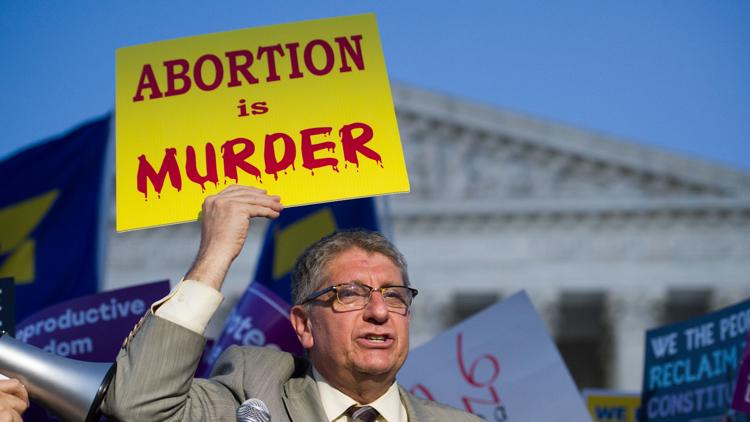WASHINGTON — An anti-abortion ad that aired during “ The View ” this past week and criticized the show's personalities was the most visible manifestation of a campaign that is making use of a federal law that forbids broadcasters from turning it down.
In the ad, a narrator says, “I am so sick of stupid celebrities and lying journalists,” while the screen shows pictures of “The View” host Whoopi Goldberg, her colleagues and other celebrities, including Taylor Swift, Oprah Winfrey, Robert DeNiro, Billie Eilish, Wolf Blitzer, Rachel Maddow and Dana Bash.
The ad compares the celebrities to Nazi leaders Joseph Goebbels and Leni Riefenstahl, criticizes the Americans for their so-called support of abortion rights and includes graphic pictures of aborted fetuses.
In a disclaimer that posted onscreen, ABC made clear it was holding the message at arm's length: “The following is a paid political advertisement, and the ABC television network is required to carry it by federal law. The advertisement contains scenes that may be disturbing to children. Viewer discretion is advised.”
Ads are the work of a longtime anti-abortion activist
Longtime anti-abortion activist Randall Terry is behind the ads. Terry is a fringe candidate for president who has qualified for the ballot in a dozen states as the standardbearer of the Constitution Party, a status that has enabled him to get airtime for his commercials.
Under Federal Communications Commission regulations, broadcast stations “are prohibited from censoring or rejecting political ads that are paid for and sponsored by legally qualified candidates,” a standard that Terry has met.
“This is the last bastion of free speech,” Terry said in an interview. “The only place that you can still have free speech is on a licensed station as a federal candidate.”
The FCC rule applies only to candidates, not political organizations, meet its criteria and doesn't apply to cable networks or web-based properties like podcasts. CNN, which is not required to show the ad and said it wouldn't meet its standards anyway, issued a statement calling it “outrageous, antisemitic and dangerous.”
Terry already has another ad — featured on his website but not yet on television — that specifically targets CNN's Jake Tapper.
“I'm not going to be the president,” Terry said. “I'm not delusional. The whole point of this is to cause Kamala's defeat.”
To that end, many of his ads are anti-Harris and, except for a brief printed message on the screen, don't even mention his candidacy. He has been running advertisements on a local level throughout the campaign, in each of the states where an abortion measure is on the ballot. A total of 40 local ads have been completed, along with a series of national advertisements, Terry said.
His target audience is people aged 50 to 80, an age group that would be most likely to watch broadcast television, who are likely Democratic voters, Catholics and Black.
Christian F. Nunes, president of the National Organization for Women, said she worries that the ads represent a manipulation of FCC regulations and are promoting hateful rhetoric.
“It's definitely concerning,” Nunes said. “No one should be able to use running for office as a free pass in order to spew hate speech.”
Terry is probably more attuned than any activist to the use of FCC rules to help spread his message, said Jack Goodman, a Washington lawyer and former general counsel of the National Association of Broadcasters. He's not aware of any efforts to change the regulations through the years.
How far can the ads go?
The rules don't permit broadcasters to edit the advertisements for use of what may be considered shocking images or language; whether or not an ad can contain an obscenity, for instance, has not been tested in court, Goodman said. On his website, Terry's so-far unaired Tapper ad includes an obscenity, although he said he will likely use a cleaner version for television.
He doesn't object to the warnings that some stations have shown before his ads.
“They're doing what they feel is in the best interest of the station,” Terry said. “That's up to them. I can't fault them for that. Look, these are hard images to see.”
Nunes said she suspects the advertisements will backfire for Terry among many women, driving them to the polls to vote against what he's advocating.



